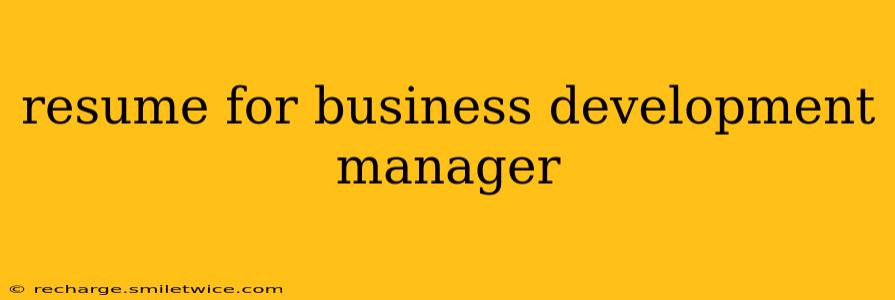Landing your dream Business Development Manager role requires a compelling resume that showcases your skills and experience effectively. This guide will help you craft a resume that not only gets noticed but also secures interviews. We'll cover key sections, essential content, and best practices to optimize your chances of success.
What Makes a Strong Business Development Manager Resume?
A winning resume for a Business Development Manager goes beyond simply listing your work history. It needs to demonstrate a clear understanding of the role's demands and highlight quantifiable achievements that showcase your impact. Keywords relevant to the industry are crucial for Applicant Tracking Systems (ATS) to identify your application. Recruiters also look for evidence of strategic thinking, relationship building, and sales acumen.
Essential Sections of Your Resume
1. Contact Information: This is straightforward, but crucial. Include your full name, phone number, email address, and LinkedIn profile URL (if you have one). Consider adding your location (city and state) – omit street address for privacy.
2. Summary/Objective (Optional but Recommended): A concise summary highlights your key skills and accomplishments relevant to the target role. An objective statement is more suitable for career changers or those with limited experience. Focus on what you bring to the table and how you can benefit the employer.
Example Summary:
Highly motivated and results-oriented Business Development Manager with 7+ years of experience driving revenue growth in the [Industry] sector. Proven ability to identify and cultivate new business opportunities, build strategic partnerships, and exceed sales targets consistently. Expertise in [mention key skills like market analysis, sales strategy, client relationship management].
3. Skills: This section is critical. Categorize your skills for clarity and impact. Use keywords relevant to business development, such as:
- Sales & Marketing: Lead generation, sales pipeline management, market research, competitive analysis, marketing strategy, digital marketing, content marketing, social media marketing.
- Business Development: New business acquisition, strategic partnerships, client relationship management (CRM), contract negotiation, proposal writing, business planning.
- Analytical Skills: Data analysis, market analysis, forecasting, budgeting, financial modeling, reporting.
- Communication & Interpersonal Skills: Presentation skills, negotiation, communication (written and verbal), relationship building, teamwork, active listening.
- Technical Skills: CRM software (Salesforce, HubSpot), Microsoft Office Suite (Excel, PowerPoint, Word), project management software (Asana, Trello).
4. Experience: Use the STAR method (Situation, Task, Action, Result) to describe your accomplishments in each role. Quantify your achievements whenever possible using metrics like percentage increase, revenue generated, or cost savings.
Example using STAR method:
Situation: Faced declining sales in a key market segment. Task: Develop and implement a new marketing strategy to revitalize sales. Action: Conducted market research, identified target demographics, created a targeted marketing campaign including digital advertising and content marketing, and trained the sales team on the new strategy. Result: Increased sales in the target segment by 25% within six months.
5. Education: List your degrees, certifications, and relevant coursework. Include your GPA if it's above 3.5.
6. Awards and Recognition (Optional): Include any professional awards, recognitions, or honors you have received.
Frequently Asked Questions (PAAs) Addressed in Your Resume Content
While you can't directly answer PAAs on your resume, addressing common concerns implicitly through strong content will indirectly answer many questions recruiters might have. This includes demonstrating skills related to the following:
- What is your experience with lead generation? Showcase specific strategies you've used and quantifiable results.
- How do you manage your time effectively? Mention your experience with project management tools and your ability to prioritize tasks.
- What are your salary expectations? This is typically discussed in the interview, but your accomplishments can implicitly suggest your value and therefore your salary expectations.
- How do you build relationships with clients? Highlight your communication skills, networking experience, and client success stories.
- What are your greatest strengths as a business development manager? This should be subtly woven throughout your summary and experience sections.
Optimizing Your Resume for Search Engines (SEO)
While your resume isn't directly indexed by search engines like a website, using relevant keywords throughout your resume helps Applicant Tracking Systems (ATS) identify your application as a match for relevant job postings. The skills section and experience descriptions are key places to incorporate these terms naturally.
Conclusion
Crafting a compelling resume is an investment in your career. By following these guidelines and tailoring your resume to each specific job application, you significantly improve your chances of landing interviews and ultimately securing your dream role as a Business Development Manager. Remember to proofread carefully before submitting!
